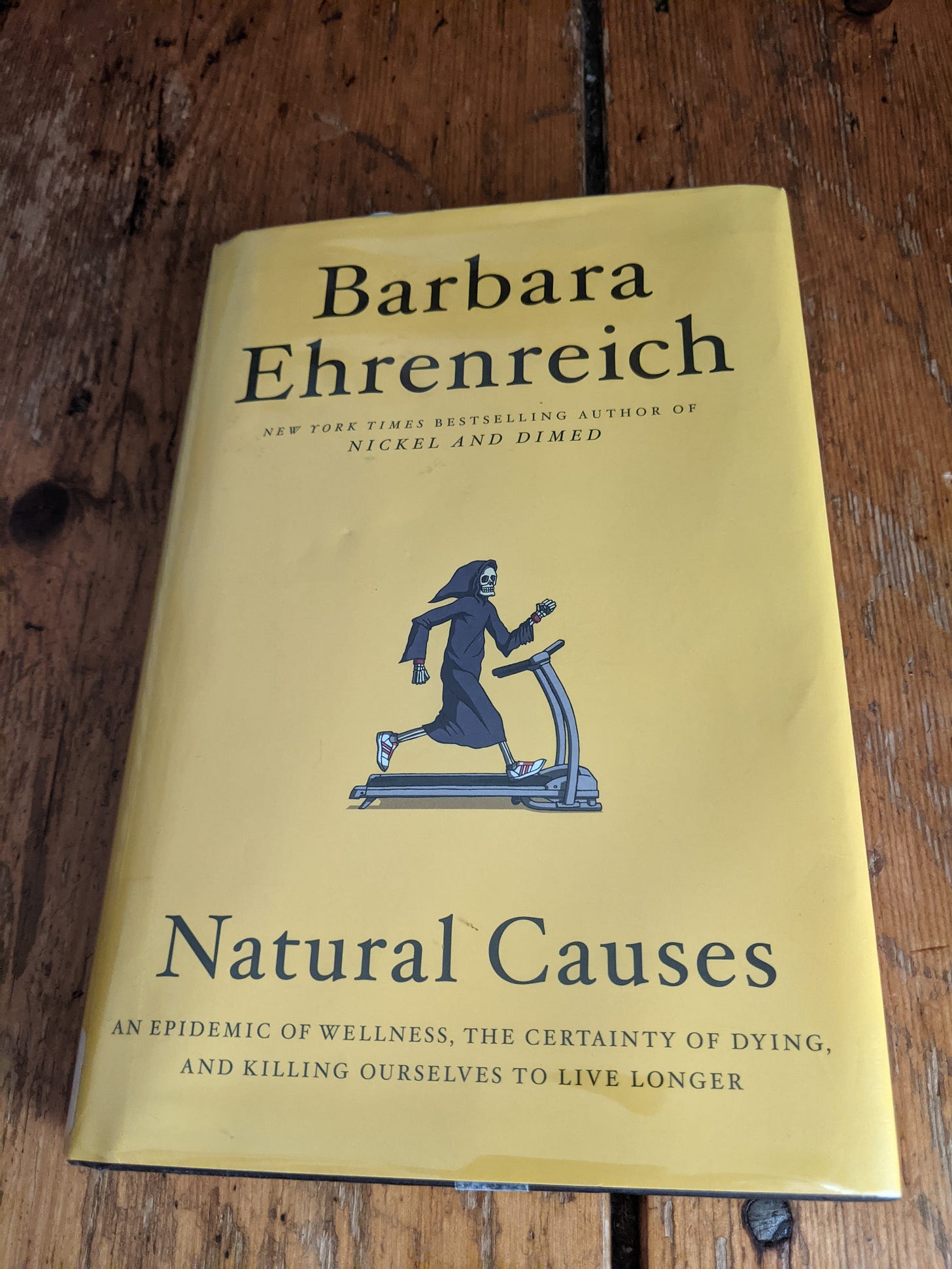A Review of Barbara Ehrenreich's book, "Natural Causes: An Epidemic of Wellness"
Longevity vs. La Vie est Belle
Barbara Ehrenreich’s recent book, Natural Causes: An Epidemic of Wellness, the Certainty of Dying, and Killing Ourselves to Live Longer, begins with her avoiding some yearly medical appointments. In her mid-70s at the time, she writes,
“Most of my educated, middle-class friends had begun to double down on their health-related efforts at the onset of middle-age, if not earlier. They undertook exercise or yoga regimens; they filled their calendars with upcoming medical tests and exams; they boasted about their ‘good’ and ‘bad’ cholesterol counts, their heart rates and blood pressure… I had a different reaction to aging: I gradually came to realize that I was old enough to die.”
So begins this winding book by the author of Nickel and Dimed which critiques what might be called the industrial-medical procedure complex, the ever-growing “routine” care that she believes is scientifically uncalled for.
Ehrenreich, who has a PhD in cellular immunology, goes into unexpected and fascinating detail about macrophages as an example of how little we understand about the immune system. Macrophages have long been known to dispose of dead or injured cells in a wound or attack microbes that have entered the body. But macrophages have also been discovered to support the growth of cancer cells and can account for up to 50% of a tumor’s mass. How much is the “immune system” (as we have labeled it) really on our side?
The book also features shockingly thoughtless assertions about alternative health, such as: “You can even find ‘holistic dentists’ although a focus on any particular part of the body seems like a violation of holism.” This is the kind of disingenuous observation you’d expect from a Fox News host, ‘Well, Greta Thunberg drove a car yesterday; I guess she doesn’t care about the environment.’
Ehrenreich also has a habit of citing the most vacuous New Age statement – “Trust your body. Every cell is on your side, which means you have hundreds of billions of allies” – and then using that as evidence for why most wellness practices are garbage.
Ehrenreich has spent decades reporting on the most precarious Americans who are struggling to stay afloat, for whom ‘wellness’ and ‘self-care’ are as accessible as Davos is to me. Understandably, she has little patience for Goop-type sillies like a $5,000 “radiofrequency” skin-tightening treatment. But her wide dismissiveness of meditation, yoga, and alternative health approaches come across as smug.
“In just the last few years, I began to hit a wall. I developed temporarily disabling knee problems… My lower back easily clenched into knots. I adjusted my routine accordingly and expanded my menu of stretches… For a moment I even toyed with the idea of a yoga class, possibly including meditation, before deciding that I’m not quite old enough for that.”
My reaction was, Wow, it’s really nice when someone’s physical pains can be alleviated by routine changes and stretching. What about the millions of people for whom that doesn’t work?
She is right to call out the fanciful claims that some alternative practitioners make. But just because yoga doesn’t cure cancer doesn’t mean that keeping us active, regulated, and balanced is small potatoes. Ehrenreich seems to confuse people who want to desperately extend their life with those who wish to improve their quality of life.
Her skepticism also leads to bizarre conclusions, such as the section where she casts the removal of cigarette smoking from public and communal spaces as a loss to be mourned, as if it were letter-writing or playing stickball in the street:
“When the break rooms offered by employers banned smoking, workers were left to brave the elements outdoors, where you can see them leaning against the wall to shelter the cigarettes from the wind. When working-class bars went non-smoking, their clienteles dispersed to drink and smoke in private, leaving few indoor sites for gatherings and conversations.”
It seems like Ehrenreich is trying very hard not to imagine why smoking was banned in these places…so that non-smokers didn’t have to inhale secondhand smoke! Like much of her previous work, Natural Causes is about class and I believe it occasionally clouds her thinking as with the example above.
But for all of the book’s reach, both fascinating and dismissive, Ehrenreich makes a compelling case that fear and denial of death has spawned a great deal of unnecessary medical interventions and health obsessions: the diets, exercise fads, and the endless screenings which lack evidence. We are exhausting ourselves before the Big Event, not appreciating what was always temporary.
Yet when I think of the beauty and transcendence of my early Alexander Technique lessons, when I felt like I was floating and pain-free, it wasn’t driven by fear of death or denial of aging. In those moments, and afterwards, I felt the cascade of my thoughts slow down and I could finally stop trying so hard to keep pain at bay. I was alert to my surroundings and at ease.
Yes, part of what people in the wellness industry do is promise impossible things to well-off people. But there are others who can also help people, especially those suffering, make the most of the time we do have.




Dan, your review is very insightful. Reading your post also led me think about how many activities like yoga and other exercise regimes also factor into our mental health.